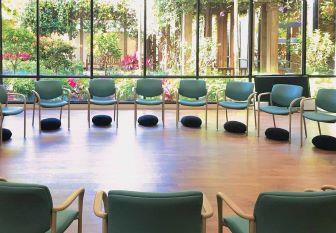Mini Strokes
Transient ischemic attack (TIA) is a brief episode during which you may experience symptoms similar to stroke such as slurred speech or blurry vision. A stroke is what occurs when blood flow to the brain is blocked or stopped. Within a few minutes of a stroke, brain cells begin to die.
Sometimes referred to as “mini-stroke” or “little stroke,” common causes of TIA are:
- Low blood flow at a narrow part of a major artery carrying blood to the brain, such as the carotid artery
- A blood clot in another part of the body (such as the heart) breaks off, travels to the brain, and blocks a blood vessel in the brain
- Narrowing of a smaller blood vessel in the brain, blocking blood flow for a short period of time; usually caused by plaque (a fatty substance) buildup
TIA Symptoms
A TIA usually lasts only a few minutes and no longer than 24 hours. While TIAs generally do not cause permanent brain damage, they are a serious warning sign of stroke and should not be ignored. TIA is a proven risk factor for stroke. The risk of stroke is highest within the first 30 days after a TIA.
Symptoms include:
- Brief period of weakness or numbness of the face, arm, or leg, especially on one side of the body
- Brief period of confusion, or trouble speaking or understanding
- Difficulty seeing in one or both eyes for a brief period of time
- Difficulty walking, dizziness, or loss of balance or coordination for a brief period of time
- Brief period of severe headache with no known cause
Common Risk Factors
- High blood pressure
- Heart disease, atrial fibrillation, and carotid or other artery disease
- High blood cholesterol
- Diabetes mellitus
- Smoking/tobacco use
- Postmenopausal hormone therapy
- Physical inactivity and obesity
- Previous TIA/stroke
Just because TIA symptoms go away does not mean the risk of a stroke has disappeared, you should still seek immediate medical attention. Only your healthcare professional can diagnose TIA/stroke and implement an appropriate plan to help reduce your risk of a subsequent stroke.
You can reduce your risk by:
- Eating smart: What you eat can play a major role in your health. Eat plenty of fruits and vegetables. These foods contain such nutrients as potassium, folate, and antioxidants. If you smoke, consider quitting.
- Getting active: The benefits of regular exercise are well known, including a reduction in your risk of heart disease because of improved blood circulation, weight loss, and prevention of bone loss. Before starting a vigorous exercise program, check with your doctor. Go that extra quarter mile if you can—you’ll be glad you did!
- Working with your doctor: They are there to help you lead a healthier, more productive life. If you have high cholesterol or high blood pressure, work with your doctor to control these conditions.
- Taking your medication: Don’t skip a day as this may increase your risk for a subsequent stroke. Also, be sure to tell your doctor about any other medications that you may be taking, as some medications can interfere with how well others work.
Jupiter Medical Center has resources to help you reduce your risk and adopt a healthier lifestyle. If you have questions about your risk and would like information about the services we provide please contact our Health Navigator at 561-263-2200.
-
Jupiter Medical Center
We want to help you! If you have questions about our services and what we can offer you and your loved ones, please reach out.
-
 April 22 Online: Mindful Movement View Event Details
April 22 Online: Mindful Movement View Event Details -
 April 22 Online: Mindful Movement View Event Details
April 22 Online: Mindful Movement View Event Details -
 April 22 Online: Mindful Movement View Event Details
April 22 Online: Mindful Movement View Event Details -
 April 22 Online: Mindful Movement View Event Details
April 22 Online: Mindful Movement View Event Details -
 April 22 Online: Mindful Movement View Event Details
April 22 Online: Mindful Movement View Event Details -
 April 22 Online: Mindful Movement View Event Details
April 22 Online: Mindful Movement View Event Details -
 June 28 Mindfulness-Based Stress Reduction (MBSR) Information Session - Summer 2025 In person View Event Details
June 28 Mindfulness-Based Stress Reduction (MBSR) Information Session - Summer 2025 In person View Event Details -
 June 28 Mindfulness-Based Stress Reduction (MBSR) Information Session - Summer 2025 In person View Event Details
June 28 Mindfulness-Based Stress Reduction (MBSR) Information Session - Summer 2025 In person View Event Details -
 June 28 Mindfulness-Based Stress Reduction (MBSR) Information Session - Summer 2025 In person View Event Details
June 28 Mindfulness-Based Stress Reduction (MBSR) Information Session - Summer 2025 In person View Event Details -
 June 28 Mindfulness-Based Stress Reduction (MBSR) Information Session - Summer 2025 In person View Event Details
June 28 Mindfulness-Based Stress Reduction (MBSR) Information Session - Summer 2025 In person View Event Details




